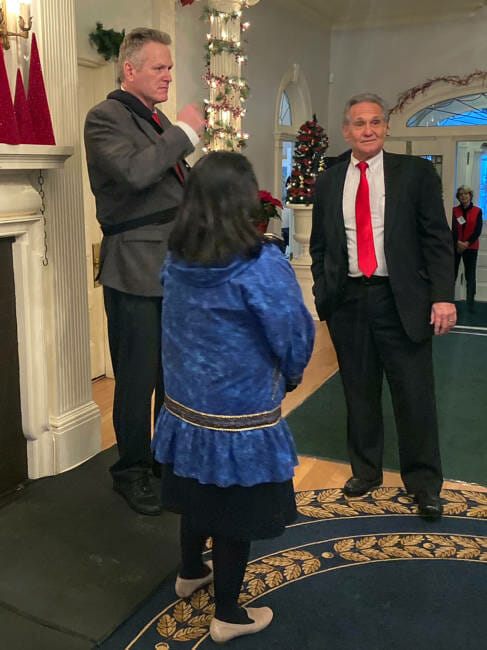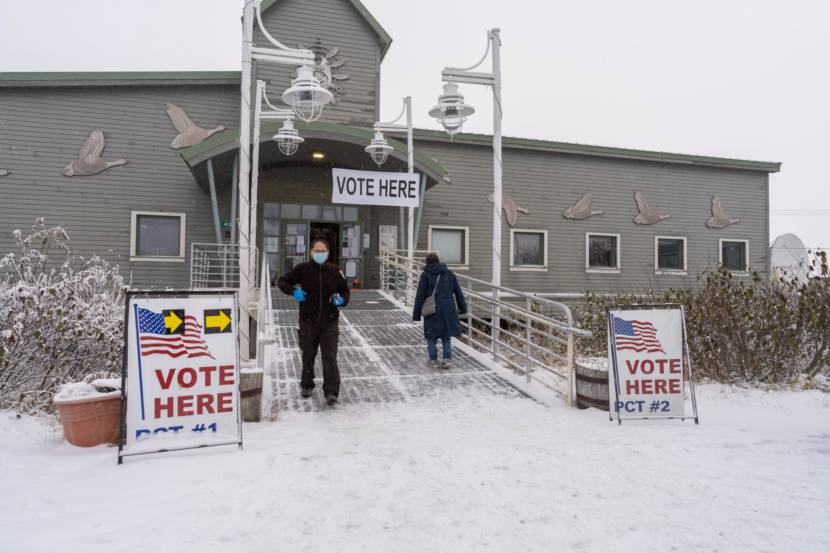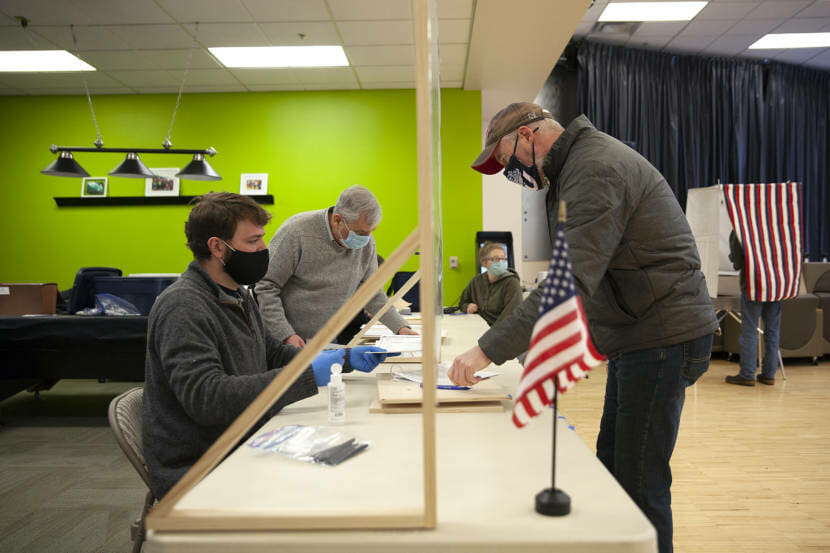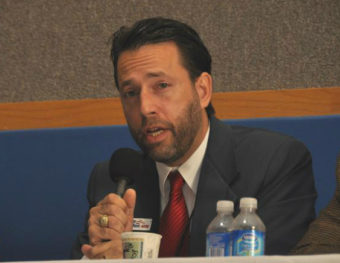
Less than a year before the next gubernatorial election, both Lt. Gov. Kevin Meyer and Gov. Mike Dunleavy have to decide if they’ll run together again – even as they face a new election system, and questions from some Alaska conservatives about Meyer’s handling of the last one.
In May, Meyer was the first major-party candidate for any office in Alaska to file a letter of intent to run next year. But he doesn’t get to decide whether voters will have a chance to vote for him again. That’s Dunleavy’s call.
Dunleavy hasn’t made an announcement about what his plans are for the ticket, but Alaskans could learn soon. Dunleavy and Meyer released a joint statement through Dunleavy’s campaign on Wednesday saying they will be making an announcement before the holidays.
Dunleavy’s ability to choose his running mate is new. It’s one of many changes made under Ballot Measure 2, the election overhaul that voters approved last year.
In the past, candidates for governor and lieutenant governor ran separately in the primary, then formed joint tickets in the general election.
Meyer said last week that, “as of right now,” Dunleavy said he wanted Meyer to be his running mate. But he acknowledged that could change.
Dunleavy could take heat from supporters regardless of what he decides. Meyer is at the center of criticism from conservative voters in places like the Matanuska-Susitna Borough, a stronghold for Dunleavy in the 2018 election. That’s because in Alaska, the lieutenant governor oversees elections. And conservatives are unhappy with how last year’s election was conducted.
But Meyer said he deserves another term, and he defended how the state handled the election in a wide-ranging interview.
He said he wants to finish the work he started over the past three years, with a focus on the economy and on Arctic issues.
Meyer previously served in the state Senate and House, as well as the Anchorage Assembly. He said his experience has prepared him to fill in as governor if needed.
“You want to make sure that the lieutenant governor — the second-in-command — is able and willing and can step up without any difficulty,” he said. “And I think my 30 years in elected office gives me that experience that, so far, I haven’t seen any other lieutenant governor candidates have.”
Meyer defeated five rivals for the Republican nomination for lieutenant governor in 2018, to join a ticket with Dunleavy, who separately won the Republican primary for governor.

One voter who doesn’t plan to support Meyer – or Dunleavy – this time is Mat-Su resident Dave Maxwell. He’s a retired electrician who prepared an online petition that calls for an audit of the last election, with a focus on Ballot Measure 2.
He said he believes there were many things wrong with the election. They include the state’s use of Dominion Voting Systems machines to count ballots. Maxwell emphasized that Alaskans told Meyer about their concerns with Dominion well before the election.
Maxwell said Meyer would have to do a lot to earn back voters’ trust.
“Kevin Meyer and his staff have lost the trust, the faith, they have lost faith in terms of this citizenship: We don’t trust them anymore,” he said. “How do you think you’re going to get that back? Just by making the next move the right move? How about, just go back and fess up what you did, and try to restore the relationship. Then, make the next move.”
Maxwell wants an election audit to go deeper than the recount Meyer ordered of Ballot Measure 2 — Maxwell wants investigators to take steps like examining whether the ballots that were counted were really ballots.
“How about a forensic audit? We treat this thing like a crime scene,” he said. “Not just go back and just … well, one, two, three. I’m sorry, that’s not what we’re looking for. We suspect a crime scene just like they have seen in Michigan, Wisconsin and Florida, just to name a few.”
Maxwell would like to see Dunleavy drop Meyer from the ticket. But he also said Dunleavy – who he once supported – should drop out of the election as well. He said there were many reasons, including Dunleavy’s handling of COVID-19.
Through Thursday evening, Maxwell’s petition had 278 signatures.
Conservative supporters of former President Donald Trump have been demanding audits of the 2020 ballots and questioning the use of Dominion machines in states across the country. Trump has spread a conspiracy theory that Dominion altered ballots, which election experts have said is false.
And nonpartisan voting experts have said state officials overseeing elections are under attack across the country based on lies told by Trump and people surrounding him.
David Becker heads the nonprofit Center for Election Innovation and Research based in Washington, D.C. Becker has done work for Alaska and other states on election accessibility and security.
Becker said there was more scrutiny and transparency in the 2020 election in both Alaska and nationally than ever before. He said the election system in Alaska and other states is the gold standard around the world, including the state’s reliance on paper ballots that can be audited.
“The 2020 election, by any objective measure, was the most secure election in American history, and in every state’s history,” Becker said.

He said Alaska had a “very successful” election, and credited Meyer with handling it – as well as post-election concerns – in a fair way.
Becker said there could be ways to improve how ballots are audited. But he said elected officials should talk with voters honestly about the strengths of the voting system. And he said those who lie about election results are doing the work of countries that want Americans to distrust elections to undermine the country.
“They need to be accountable for their lies and their incitement,” Becker said. “There need to be investigations. There need to be prosecutions. There needs to be jail time. And there needs to be civil judgments and penalties.”
Becker cited attacks on Dominion machines as an example, noting that investigators have disproved allegations repeatedly. And he noted that prominent people who’ve attacked Dominion are facing defamation lawsuits.
Meyer said every allegation made regarding Alaska’s election has been investigated or is under investigation. He encouraged those who have questions about the process to become election workers or observers.
But he also said some concerns reflect misinformation voters have received.
“We were geared up for the misinformation coming from international sources,” he said. “But what has surprised me the most – and probably caught me off-guard the most – was the misinformation we’re getting from domestic sources.”
Meyer said it’s been shocking.
“I mean, there’s a movement here, in all 50 states, to still challenge the 2020 election,” he said. “And we have found no evidence to indicate any fraud in the election, at least in Alaska.”
Meyer said that Dominion machines were chosen based on the state procurement processes and that the machines aren’t tied to the internet. And he noted that he ordered a hand count of the Ballot Measure 2 results, which did not change the outcome. He added that a nonpartisan state review board certified the election results.
Meyer said it bothers him that election workers who are dedicated to their work have faced criticism over the election.
He has proposed some changes to the election system that would require the Legislature to pass a new law. They include increasing the number of ballots that are audited.
Meyer said that he and Dunleavy have a relationship that’s typical for a lieutenant governor and governor.
When Meyer was asked on Friday whether Dunleavy has told whether he plans to have him be his running mate, he said:
“Yes, he has asked me, and I said yes,” Meyer said. “Now, you know, things may happen between now and June 1. But as of right now we’re running as a team.”
Independent former Gov. Bill Walker of Anchorage has picked Heidi Drygas of Juneau to serve as his running mate.
Libertarian Billy Toien has chosen Shirley Rainbolt. Democratic former Rep. Les Gara and Republican Rep. Christopher Kurka have not announced their running mates.

Kurka and a prominent supporter, Joe Miller, have criticized the election administration. Miller has said that he still has questions about a hack of the state’s voter registration system before the election.
“And, perhaps, votes were changed,” Miller said. “We’ll never know.”
Meyer said the FBI and the U.S. Department of Homeland Security’s Cybersecurity and Infrastructure Security Agency investigated the hack and found no evidence of any fraud. He said both his office and the Division of Elections have made data security their top focus.
Meyer said he’s concerned that statements like Miller’s may undermine Alaskans’ trust in elections.
“Anybody can say that. That’s a very open, subjective comment,” he said. “But I’m going to go with what the FBI and CISA – Homeland Security – had told me, in that none of this information was used in a fraudulent manner.”
Meyer’s oversight of elections will be put to another test this year, as the state puts its new election system into practice.